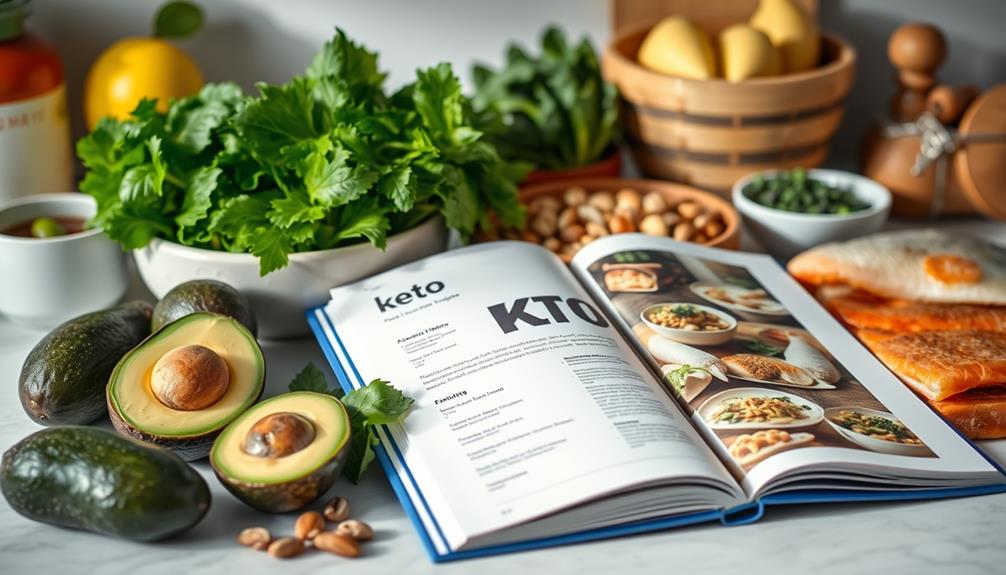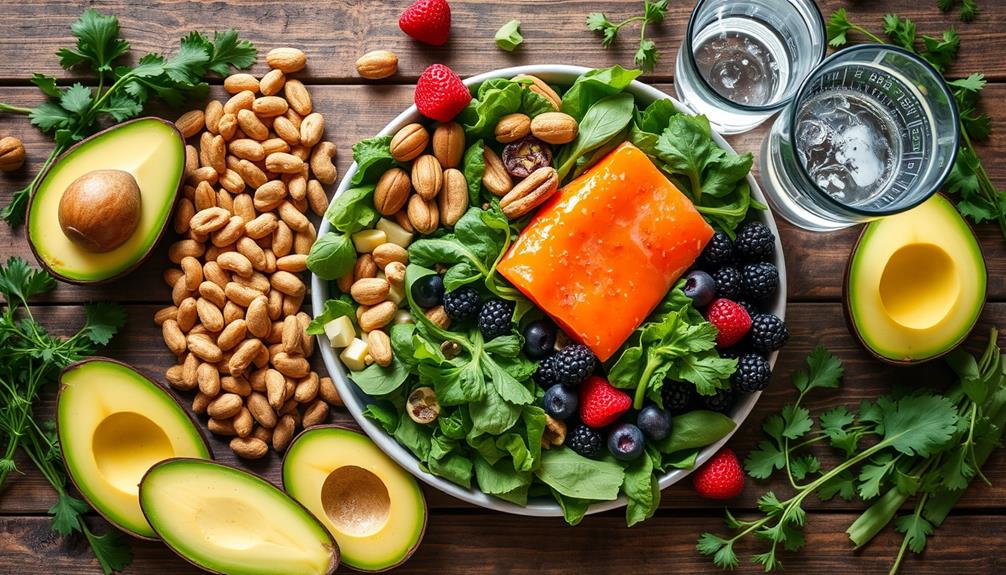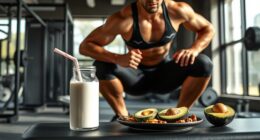The best keto diet for women focuses on customized macronutrient ratios, typically 55-70% fat, 20-35% protein, and under 10% carbohydrates. It's essential to stick to about 20-50 grams of carbs daily to maintain ketosis. Incorporate nutrient-dense foods like leafy greens, fatty fish, and healthy fats like avocado and olive oil for maximum health. Consider gender-specific factors, like hormonal fluctuations and nutritional needs during different life stages. To tackle possible challenges like "keto flu," stay hydrated and monitor electrolytes. Keep exploring tailored resources to support your keto journey and discover the unique benefits it offers. Additionally, it’s important to adjust your approach as you age, since the *best keto options for seniors* may prioritize foods that support bone health, cognitive function, and muscle preservation. Incorporating high-quality sources of protein and omega-3 fatty acids, such as salmon and chia seeds, can greatly benefit seniors on a keto diet. Regularly consulting with a healthcare provider ensures that nutritional needs are met at every life stage.
Key Takeaways
- The best keto diet for women emphasizes a high-fat (55-70%), low-carb (<10%), and moderate protein (20-35%) macronutrient distribution.
- Incorporate nutrient-dense foods like leafy greens, fatty fish, and avocados to support overall health while on the keto diet.
- Women may experience unique benefits from keto, including improved weight loss, blood sugar control, and hormonal balance, especially for those with PCOS.
- Monitor individual health responses and adjust macronutrient intake based on personal goals, activity levels, and hormonal fluctuations.
- Seeking expert guidance and connecting with online communities can provide tailored strategies and support for women following the keto diet.
Understanding the Keto Diet

Understanding the keto diet begins with grasping its unique macronutrient distribution. The keto diet typically consists of high-fat (55-70%), low-carb (<10%), and moderate protein (20-35%) ratios. This distribution encourages your body to enter a metabolic state known as ketosis, where it burns fat for energy instead of carbohydrates.
To achieve ketosis, you'll need to reduce your daily carb intake to about 50 grams or less, which helps lower insulin levels and makes stored fat accessible for energy. Additionally, incorporating nutrient-dense foods like leafy greens can enhance overall health during your keto journey.
For women, the keto diet can lead to effective weight loss and improved blood sugar control. However, it's crucial to monitor hormonal fluctuations that might affect your results. The diet emphasizes consuming nutrient-dense foods like animal proteins, healthy fats, low-carb vegetables, and limited low-sugar fruits, which support overall health while you follow this eating plan.
Originally designed to treat epilepsy in children, the keto diet has gained popularity for its potential in weight management and metabolic health. By understanding its macronutrient profile and how it works, you can better navigate your journey into keto and enjoy its benefits.
Benefits of Keto for Women

The keto diet offers numerous benefits specifically for women, making it an appealing choice for those looking to enhance their health and well-being.
One of the standout benefits is weight loss; studies show that women on keto diets lost an average of 2 lbs (0.9 kg) more than those on low-fat diets over one to two years.
Additionally, if you have type 2 diabetes, you'll likely experience improved blood sugar control, as evidenced by reduced HbA1c levels in women following a keto diet.
Moreover, it's important to take into account how dietary adjustments can affect overall health, as seen in food recommendations for gout management.
You may also notice increased energy levels and improved mental clarity, thanks to your body shifting to fat for fuel instead of carbohydrates.
For women dealing with Polycystic Ovary Syndrome (PCOS), keto can help manage symptoms by improving hormonal balance and insulin sensitivity.
Furthermore, research has suggested that women with cancer experience increased ketone levels and enhanced physical function while on the diet.
Foods to Include on Keto

When starting on a keto diet, choosing the right foods is essential for success. Focus on high-fat, low-carb options to keep your body in ketosis. Here's a breakdown of foods to include:
| Food Category | Examples |
|---|---|
| Animal Proteins | Fatty fish (salmon), poultry, eggs, red meat |
| Healthy Fats | Olive oil, coconut oil, avocados |
| Low-Carb Vegetables | Spinach, kale, zucchini |
| Nuts and Seeds | Almonds, chia seeds, walnuts |
Incorporate animal proteins like fatty fish, which are high in omega-3s and nearly carb-free. Dairy products, particularly high-fat cheeses and plain Greek yogurt, can support your calcium intake and keep you feeling full. Dark leafy greens, such as spinach and kale, are nutrient-dense and low in carbs, making them perfect for a ketogenic diet. Don't forget about nuts and seeds; these provide healthy fats but be mindful of portion sizes due to their calorie density. By focusing on these foods, you'll stay aligned with your low carb diet and enjoy the benefits of a high fat diet while nourishing your body.
Gender-Specific Considerations

Many women find that their unique nutritional needs can greatly impact their experience on the keto diet. During different life stages such as fertility, pregnancy, and breastfeeding, you may require additional nutrient intake to support your health.
Hormonal fluctuations can make it tougher for you to achieve weight loss on keto, especially during perimenopause when your metabolism may slow down. This can hinder fat loss efforts. Additionally, women with emotional dysregulation may experience heightened challenges in managing their diet, as seen in those with Borderline Personality Disorder.
Moreover, research shows that women are often more susceptible to the negative effects of low-carb diets on hormonal balance, which can disrupt menstrual cycles and overall reproductive health.
However, the keto diet can also improve insulin sensitivity and hormonal balance for women with conditions like PCOS, potentially enhancing both fertility and weight loss.
It's essential to monitor your individual responses to the keto diet. Factors such as stress, caloric intake, and nutrient density can substantially influence your health outcomes.
Starting Your Keto Journey

As you start your keto journey, it's vital to assess your personal goals to tailor the diet to your needs.
Understanding the importance of a balanced diet rich in fruits, vegetables, and whole grains can help improve overall health while on this low-carb plan.
Tracking your macronutrients will help you stay on course and guarantee you're hitting that critical 50 grams of carbs or less each day.
Assessing Personal Goals
Before diving into the keto diet, it's essential to reflect on what you hope to achieve. Setting clear personal goals helps guide your journey and keeps you motivated. Are you aiming for weight loss, improved blood sugar levels, or simply a boost in energy? It's important to monitor these aspects as you progress.
To evaluate your overall well-being, consider the following factors:
| Goals | How to Monitor |
|---|---|
| Weight Loss | Track your weight weekly |
| Blood Sugar Control | Conduct regular blood sugar tests |
| Hormonal Balance | Evaluate changes during your menstrual cycle |
Additionally, pay attention to your mood and sleep quality, as these can reflect the diet's impact on your health. Don't forget to conduct cardiovascular tests before and after starting the ketogenic diet to understand your baseline and track improvements. Remember, avoid jumping on trends; focus on your individual response and adapt your approach based on your body's needs. By evaluating your personal goals, you'll create a path that promotes lasting health benefits and aligns with your overall well-being.
Macronutrient Tracking Essentials
Tracking your macronutrients is vital for a successful keto journey. On a keto diet, your macronutrient distribution should ideally consist of 55-70% fat, 20-35% protein, and less than 10% carbohydrates. To maintain ketosis, it's important to limit your carbohydrate intake to about 20-50 grams daily. This shift allows your body to burn fat for energy instead of glucose.
Understanding common financial terms can also empower you to make informed decisions about investing in your health through dietary choices.
Each woman's macronutrient needs vary based on age, activity level, and overall health, so personalized tracking is key for best results. Utilize food diaries or mobile apps to accurately count your macronutrients and guarantee adherence to keto guidelines. These tools help you stay focused on your dietary goals while making it easier to track your intake.
Additionally, regularly monitoring ketone levels through urine strips, breath analyzers, or blood tests can help you determine if you're in ketosis. This feedback allows you to adjust your macronutrient intake as necessary to stay on track.
In doing so, you'll not only support your weight loss efforts but also enhance your overall women's health. Stay committed to tracking, and you'll be well on your way to achieving your keto goals!
Managing Keto Challenges

Steering through the early days of the keto diet can feel overwhelming, especially with challenges like the "keto flu." Symptoms such as fatigue, irritability, and nausea often hit as your body adjusts to burning fat for fuel. To manage these challenges effectively, consider a gradual reduction of carbohydrates rather than an abrupt cut. This approach can ease your shift into ketosis and minimize side effects.
Monitoring electrolyte levels is essential during this phase. Low-carb diets can cause your kidneys to excrete more sodium and potassium, leading to imbalances. Staying hydrated is equally important, as increased water loss can occur during ketosis, heightening the risk of dehydration and exacerbating symptoms.
Incorporating nutrient-dense, low-carb vegetables into your meals will help address potential deficiencies. Pair these with healthy fats to support your overall well-being on the diet.
Support and Resources for Women

As you navigate the keto diet, having the right support and resources can greatly enhance your experience. Women's health requires unique considerations, and tailored fasting strategies can be essential. Seeking expert guidance, like that from Dr. Mindy Pelz, helps guarantee you're meeting your nutritional needs while supporting hormonal balance.
Online communities serve as fantastic platforms where you can share your experiences, challenges, and successes with fellow women on the keto journey. These spaces foster a sense of belonging and encouragement, making your shift smoother.
Additionally, educational resources such as articles and videos can deepen your understanding of the keto diet's implications for women's health, helping you make informed decisions.
Don't overlook the importance of key supplements like electrolytes, omega-3 fatty acids, vitamin D, MCT oil, and greens powder to prevent deficiencies.
Staying updated with the latest research updates on cholesterol, dietary impacts, and gut health will empower you to adapt your diet as needed.
Frequently Asked Questions
Does a Keto Diet Work for Females?
Yes, a keto diet can work for you. Many women experience weight loss and improved blood sugar levels. However, it's crucial to monitor your health closely and consult a professional for personalized guidance.
What Are the Top 5 Keto Foods?
Did you know that incorporating fatty fish can greatly boost your omega-3 intake? For top keto foods, focus on fatty fish, eggs, avocados, cheese, and low-carb vegetables to enhance nutrition and satisfaction in your meals.
What Is the Most Recommended Ketogenic Diet?
The most recommended ketogenic diet emphasizes a macronutrient ratio of 55-70% fat, under 10% carbohydrates, and 20-35% protein. Focus on whole, nutrient-dense foods to effectively induce ketosis and support your overall health.
How Can a Woman Lose Weight on Keto?
To lose weight on keto, you'll focus on low carbs, high fats, and moderate proteins. Monitor your portions, stay hydrated, and listen to your body's hunger cues to maintain your energy and support fat loss.
Conclusion
Embracing the keto lifestyle can be a delightful adventure for you. By understanding its benefits and tailoring it to your unique needs, you're setting yourself up for success. With the right foods and a sprinkle of determination, you'll navigate any bumps along the way. Remember, you're not alone on this journey—there's a vibrant community cheering you on. So, take the plunge, savor the flavors, and watch as you transform into your best self!









